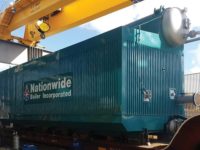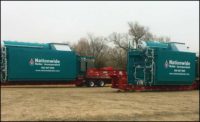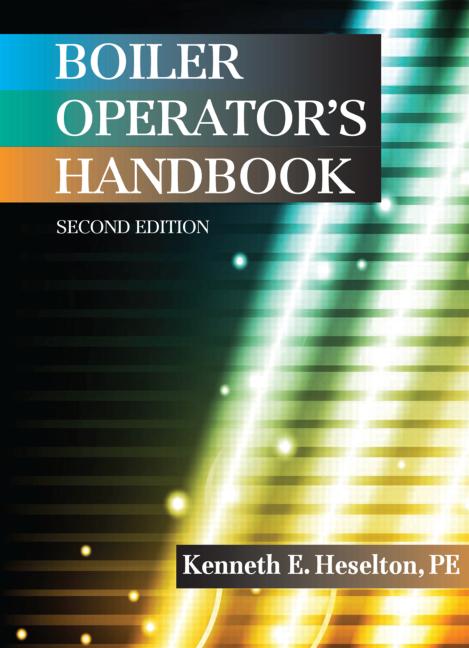
Figure 1. Whether a boiler is shipped
by air, trailer, rail, or sea, it is important that you plan in
advance for its arrival. (70,000 lb/hr trailer-mounted boiler being
loaded on the Antonov AN124-100 aircraft.)
There are over 160,000 industrial and commercial boilers in the United States producing steam and hot water for industries including food, paper, chemical, refining, power, and metals.
Whether it is for an unplanned or planned maintenance outage, increased capacity requirements, or because of an unforeseen project delay or act of nature, the demand for rental boilers will exist. When the need arises, there are many aspects of renting a boiler that users must consider and address. By understanding the rental process and following the guidelines below, it is possible that the result will be both cost-effective and technically successful.
MOBILITY AND LOCATION
Upfront planning is the most important stage when renting boiler equipment. The first requirement is determining the total capacity and operating characteristics of the boiler system. Multiple boilers can often be arranged in parallel to increase plant capacity to any desired level, although this may involve renting one or multiple mobile steam plants or trailer-mounted boilers.When possible, mobile equipment is preferable to skid-mounted equipment and is less costly, due to fast delivery and no special foundation or footing requirements needed to support the unit. In addition, when compared to a skid-mounted boiler, a trailer-mounted boiler (with a capacity up to 120,000 lb/hr) is the most economical to rent, since the need for a new foundation, crane handling, and special rigging can be avoided.

Figure 2. Two 70,000 lb/hr
trailer-mounted boilers and one 140,000 lb/hr mobile feedwater van.
SUPPLIER CONSIDERATIONS
Once maximum potential steam requirements are determined and an ideal location for the equipment has been selected, it is time to evaluate a supplier. Though not always feasible, the best way to evaluate a rental company is to visit its facility. Observing work in progress at the company’s facility can provide valuable insight into the quality of the equipment and service the company is accustomed to providing. However, if you are unable to conduct a site visit, then asking the right questions will quickly help you decide which company you feel most comfortable to rely on to meet your unique needs and requirements.An item to consider during the evaluation process includes knowing if the company is a full-time, dedicated rental company with the experience, equipment, and capabilities you require. Be cautious with firms that claim to be full-time and offer below market-level pricing. Sometimes these firms can offer a better price, but equipment age, reliability, startup, support, code compliance, and conformance to emissions regulations are a few areas that may require extra attention.
Next, pay special consideration to where the company’s equipment is located, in addition to the location of technical representatives and start-up technicians. Most established rental companies have trained representatives in all major industrial areas who are trained and familiar with the rental company’s equipment and procedures. In addition, you should always ask if the rental company has multiple storage locations, which aids in minimizing transportation costs and travel time.
When it comes to evaluating a supplier’s proposal, there are a number of issues that need to be addressed to make certain that what you want and need are what you are going to be charged for. The proposal should include normal factors, such as a clearly defined rental rate, payment terms, change-of-scope clauses, liability coverage, transportation costs, and a warranty statement. A well-written proposal should also address the anticipated term on the rental unit, freight costs, and time and travel charges for technicians and should specify appropriate responsibility for installation and removal costs. It should also be clear that any additional costs, such as for repairs resulting from normal use, should be the responsibility of the rental company. Moreover, repairs that result from poor maintenance or improper operation from the rental company will be billed back to the company.
In addition to a concise proposal, reputable rental companies will also be able to provide a complete set of drawings and equipment specifications in considerable detail. Detailed equipment specifications include items such as the total capacity and operating characteristics of the boiler, water treatment needs and requirements, emissions requirements, weather protection, performance testing, and ASME code requirements.
PREPARE FIRST, THEN MAINTAIN
Once a rental company is selected, the rental agreement signed, and the delivery and start-up schedule is determined, the user must be certain that the site is ready for delivery and well-trained boiler operators have been selected to safely operate the equipment. The next step is to arrange for any necessary operating permits required from regulatory agencies. This includes any special permits that may be required in those areas where emission limits are strictly controlled. For locations that must comply with stringent NOx regulations, be sure to inquire about low NOx technology options such as selective catalytic reduction systems that can be easily installed and shipped with the boiler to make certain environmental compliance is achieved.To ensure continuous, safe, and trouble-free performance, there are a number of regular checks and maintenance tasks which must be performed during normal operation of the equipment. It is important that a log sheet be kept on site for the recording of every routine check and maintenance items completed.
Daily checks include an examination of all safety devices, followed by an inspection of the low-water cutoff during every shift. The entire system should also be checked for leaks, including the fuel supply system. Any irregularities must be corrected immediately. It is also important to check the flame pattern of the burner to make sure the combustion devices are working efficiently.
To maintain continuous proper boiler performance, feedwater treatment and correct blowdown techniques must be performed. Makeup and boiler water quality should be checked at every shift and boiler water treatment chemicals must be used. Failure to maintain proper water chemistry is a major cause of damage to rental boilers and the single biggest rehabilitation expense. Make sure the rental company provides sample coolers on their equipment to facilitate the water chemistry. Also, get your water treatment company on board right away to include the rental boiler in their normal services.
CLEANUP AND RETURN
There are certain steps to ensure the safe return of a unit to the rental company’s facility. It is the responsibility of the user to have plant or local boiler shop personnel disconnect equipment after use, which includes draining and flushing all boiler lines with clean water to help minimize any chance of corrosion. This also applies to valves, gauges, controls, and piping which are susceptible to freezing when exposed to wintry conditions during transit.Next, the stack, non-return valves, and safety valves are to be removed and securely stored in their proper place for shipment. Lastly, a complete check of the condition of the boiler and the boiler tubes for build-up should also be noted. When the final inspection is complete, all items should be properly documented, recorded, and sent to the rental company once the equipment is shipped back to the rental company.
Even if all the guidelines above are considered, it is still possible for things to go wrong. Most often, this relates to reasons including inadequate planning and budget allotment, non-engineering installation, lack of qualified operators, poor water treatment, and lack of proper maintenance. As long as you plan in advance, budget accordingly, verify connection sizes and permitting issues, properly train operators, frequently monitor the feedwater quality, and take responsibility in maintaining the equipment once it is installed, you can be confident that the risks associated with renting equipment will be minimized and that your project will be a success.
It may never be quite as easy to rent a boiler as it is to rent that convertible on your vacation, but with a little advanced planning and by exercising a little caution when evaluating the supplier, the equipment, and the proposal, you can avoid most potential problems that you might not otherwise consider.
Nationwide Boiler’s Emergency Preparedness Plan is a useful tool to aid in planning for the installation of a temporary steam plant before the need actually arises. Download your free copy today atwww.nationwideboiler.com.TB




